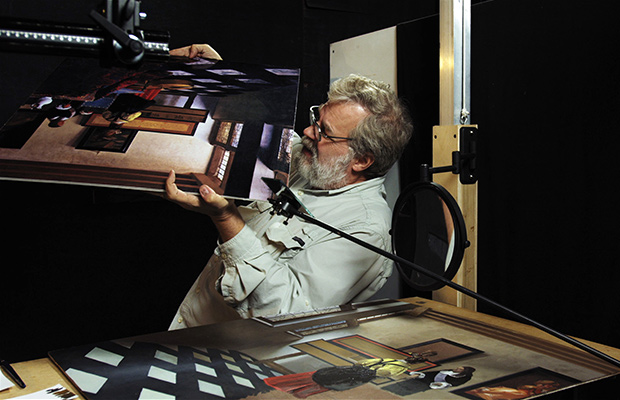Reviews
Tim’s Vermeer | Review
Teller Makes Watching Jenison’s Paint Dry Fun
Tim Jenison is not a painter. In fact, he lies on the opposite end of the spectrum of skill sets as a technically savvy inventor whose company NewTek specializes in technology for digital video post-production. To people working in the video industry, Jenison is most known as the creator of the Video Toaster, but his interests are not limited to video production. He’s a tinkerer whose pursuit for knowledge sees no bounds. Though his career started in repairing arcade machines, his interest in the mechanics of player pianos as a teen led him to restore one and learn to play it by slowing down the rolls to mime the fingerings of old Fats Waller tunes. Having been friends with Jenison for years, Penn Jillette, of the magic Las Vegas staple Penn & Teller, was long unaware of the inventor’s obsession with the Dutch painter Johannes Vermeer’s revolutionary photorealist paintings. Through their friendship, Teller took the helm of his first feature, Tim’s Vermeer, to witness Jenison’s attempt to recreate Vermeer’s most revered work, The Music Lesson, with hilarious and heartrending dedication to investigating the mechanics behind immaculate artistry.
Art historians and realist contrarians have long argued the likelihood that Vermeer, among other artists of the period, used some form of optic technology to recreate the perception of natural light on a canvas. Vermeer was one of the first to truly portray how the human eye sees light interact with objects within a frame. Most theories involve the use of a camera obscura to project a real life scene onto a flat surface for the artist to basically trace over, but this does not account for the incredible accuracy of color tones and contrast detail in Vermeer’s work. After much contemplation and a warm bath, Jenison came up with an insanely simple concept – by projecting an image through a camera obscura (an enclosed lens which projects the original image upside down) and looking at it through a small mirror placed at an 45° angle above the canvas, Vermeer could fluidly compare his in-progress painting to the live image he was trying to recreate. Having never painted before, Tim decided to test this theory in oil, painting a photo of his father-in-law in astounding detail in just five hours. Even to an art connoisseur’s eye, Jenison’s first attempt with a brush looks like the work of a seasoned veteran. But this was just the beginning of his investigation.
Teller’s film sees Jenison employ his monetary opulence and inexhaustible propulsion to understand how to literally recreate the room in which Vermeer painted much of his work and the tools he may have used to produce it. Being that Tim does not hold the title of optics specialist, carpenter, seamstress or a laundry list of others, he sets to work blindly with only his will and ever expanding ingenuity at hand. He even travels to Holland and learns Dutch for an additional layer of understanding of his task at hand.
With Penn’s signature historically based narration pushing forward with personal predilection with regards to Tim, this costly passion project is shown to be a perfect portrait of the type of obsession that is required of genius. And yet Jenison’s story, more than anything, begs the question of why technology has always inherently been in opposition of art. Tim’s Vermeer unquestionably proves that it doesn’t take a master painter to employ a few shards of glass, a canvas and a palate of oils to create astounding works of photo-realism, but the art world will surely claim this as cheating. What if Jenison’s theory is right and Vermeer’s watershed paintings are the product of a self produced technology rather than a mysticized savant? As always, Penn & Teller entertain, educate and ask us to question our own perception, this time of art history and what the creation of art means. Is the technique behind the creative process just as important as the resulting piece of art?
Reviewed on September 6 at the 2013 Toronto International Film Festival. TIFF Docs Programme. 80 Mins

































